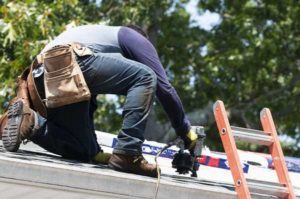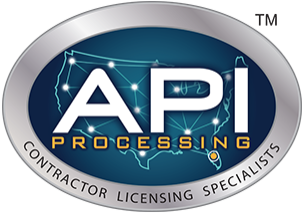Do you need a Contractor License in California or License Reciprocity?
Are you interested in obtaining a general contractor’s license in the State of California for an existing company? Do you need help with California reciprocity procedures? California has reciprocity agreements with four states: Arizona, Louisiana, Nevada and Utah.
 How to get California General Contractor Licenses, Alarm, Fire, Electrical or Roofing Contractor License
How to get California General Contractor Licenses, Alarm, Fire, Electrical or Roofing Contractor License
API offers contractor licensing application assistance in Burglar Alarm, Electrical, and Construction license classifications. API has been working in the Electrical and Construction Licensing Industry since 2002, and has the knowledge, resources, and expertise to help get you licensed.
Other California Licensing & Application Services.
Does your business need a qualified listed agent? Do you need help forming a corporation, LLC, or partnership entity? Does your California business need a surety bond?
California has four main Contractor License Classifications:
- A - General Engineering Contractor
- B - General Building Contractor
- B-2 - Residential Remodeling Contractor
- C - Specialty Contractor
What are the license requirements for California Contractors?
Here is a list of requirements to obtain a California State Contractors License:
- Must prove at least four years of experience per classification. An individual outside of the company seeking licensing must Certify the experience.
- Must apply first to gain approval to exam.
- There will be a California Law and Business Exam, as well as the main Trade Exam.
- The Trade Exam can be waived by reciprocity on a case-by-case basis. Reciprocal states are Louisiana, Arizona, and Nevada, and the person must have passed the similar Trade Exam in these states. California Law and Business Exam is still required.
- If fingerprinting is done in the state of California, it prevents processing delays of up to two months.
- $450 Application Fee
- Bonding Requirements
- Fingerprint and Background Check will be required
- Additional documentation may be required.
API can Help and Handle the Entire Application Process!
Our staff will simplify the entire licensing process and is dedicated to helping Contractors obtain their State License.
Unlike our competitors, API manages the entire Application Process from start to finish. We oversee your application until it is approved and can save you time and money.
API has been working with State Contractors since 2002 and have the knowledge and resources to deal with issues and special circumstances that could stall the licensing process.
Drop us a line today for a free quote! We can assist you with the following services:
- Determine License Eligibility
- Applications for State Contractors License
- Applications for a Company Business License
- Designated Resident Qualifying Agent
- Out-of-state Licensing
- Provide Listed Qualified Agents
- Statement of Ownership
- Consult and Educate Clients on Licensing Laws
- Prepare & process Exam Applications & Registration
- Exam Support
- Initial Certification
- License Renewals
- Reciprocity
- Provide Qualifier Placement
- Bonding, Insurance and Surety Bonds
- Form corporations, LLC’s, Partnerships, Corporations
- Certificate of assumed name
California State Licensing Board Resources
Common Problems to Avoid When Filing Your California Contractor License on Your Own
When filing for your California contractor license independently, it’s crucial to be aware of common problems that can lead to delays or even denial of your application. These issues often include incomplete or inaccurate documentation, not meeting the specific educational and experience requirements, misunderstanding or overlooking state and local regulations, inadequate preparation for required exams, and underestimating the time needed to navigate the bureaucratic process. To avoid these pitfalls, make sure your application is thorough, accurate, and aligned with all the Contractors State License Board (CSLB) guidelines.
Here are the most common problems:
1. Complex Application Requirements
Obtaining a contractor license in California involves a detailed process that requires specific documentation, such as proof of work experience, financial stability, and insurance. Each section of the application must be completed accurately and thoroughly. Missing or incorrect information can result in significant delays or even rejection of your application.
2. Stringent Educational and Experience Requirements
Each type of contractor license in California has its own set of prerequisites related to education and professional experience. These requirements can be challenging to meet, as applicants must provide verifiable proof of their qualifications. Applicants often struggle to match their experience with the specific classifications they are applying for, which can lead to application denial if the experience does not meet the CSLB’s standards.
3. Navigating State and Local Regulations
Understanding and complying with both state and local regulations in California can be confusing, especially for contractors who intend to work in multiple jurisdictions. California’s construction regulations are comprehensive and can vary significantly from one locality to another. This can complicate compliance and lead to unintentional violations that could delay your licensing process or result in penalties.
4. Examination Preparation
Most contractor licenses in California require passing one or more examinations that cover law, business, and trade-specific knowledge. These exams are rigorous and designed to assess a wide range of knowledge and practical skills. Inadequate preparation for these exams can lead to failure, requiring you to retake the exams and delaying your licensing process.
5. Delays and Bureaucratic Hurdles
The licensing process in California can be slow, with unexpected delays often arising, especially when applications are incomplete or contain errors. The CSLB has a strict review process, and any mistakes can lead to your application being returned for corrections, which significantly prolongs the process. Navigating the bureaucratic aspects of the process, including understanding the necessary timelines and requirements, can be challenging and time-consuming.
To avoid these common pitfalls, it’s important to ensure that your application is comprehensive, accurate, and complies with all CSLB guidelines. Preparing thoroughly for exams and staying informed about state and local regulations will also help you navigate the licensing process more smoothly.
California Contractor Licensing Terms You Need to Know
Obtaining a contractor license in California is a detailed process that requires careful attention to various requirements, including documentation, educational and experience qualifications, exam preparation, and adherence to state and local regulations. To successfully navigate this process, it's essential to understand the key terms and concepts related to contractor licensing in California. Knowing these terms will help ensure your application is complete and accurate, increasing your chances of obtaining your license without unnecessary delays.
Common Terms and Explanations Related to California Contractor Licensing
- Contractors State License Board (CSLB). The CSLB is the governing body responsible for issuing contractor licenses in California. It sets the regulations, requirements, and standards for obtaining and maintaining a contractor license in the state.
- License Classification. This refers to the specific type of contractor license you are applying for, which is based on the type of work you plan to perform. Common classifications include General Building (B), General Engineering (A), and various specialty classifications (C).
- Qualifying Individual. This is the person who meets the experience and examination requirements for the contractor license. The qualifying individual is often the owner, partner, or officer of the contracting business.
- Journeyman-Level Experience. This term refers to the level of experience required for most contractor licenses in California. It indicates that the individual has the necessary skills, knowledge, and experience to perform the trade without supervision.
- License Bond. A license bond is a type of surety bond required by the CSLB for all contractors. It serves as a financial guarantee that the contractor will comply with state laws and regulations and protects consumers against any potential damages or losses caused by the contractor’s failure to meet these obligations.
- Business and Law Exam. This is a mandatory exam for all contractor license applicants in California. It tests knowledge of business management, law, and construction regulations, ensuring that contractors understand the legal and administrative aspects of running a contracting business.
- Trade Exam. Depending on the classification, a trade exam may be required. This exam assesses the applicant’s knowledge and skills in the specific trade or type of construction work they will be performing.
- Workers’ Compensation Insurance. This insurance is required for all contractors with employees. It provides coverage for work-related injuries and illnesses and is mandatory to protect both the contractor and their employees.
- Continuing Education. While California does not currently require continuing education for license renewal, staying up-to-date with industry practices and changes in regulations is crucial for maintaining a good standing with the CSLB and ensuring professional growth.
- Application Processing Time. This term refers to the time it takes for the CSLB to review and process a contractor license application. Processing times can vary based on the completeness of the application and the volume of applications received by the CSLB.
